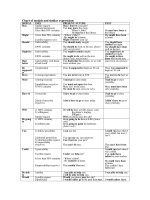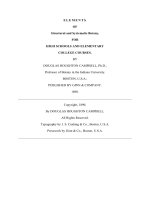Neurological emergenciesSarah RamsayDept of Anaesthesia and ICU
Bạn đang xem bản rút gọn của tài liệu. Xem và tải ngay bản đầy đủ của tài liệu tại đây (318.87 KB, 40 trang )
Neurological emergencies
Sarah Ramsay
Dept of Anaesthesia and ICU
Are you in a coma or only
sleeping??
Approach to the unconscious patient
Specific conditions
Simultaneous….
Assessment AND treatment
Avoid secondary injury
Purpose of assessment
• To document the level of consciousness
and other brain functions so that the
patient's progress can be followed
• To localize pathology and narrow the
differential diagnosis
Not sleeping….
• General examination
• Neurological examination
– GCS
– Brain stem function (pupils, gag etc)
– Other cranial nerves
– Peripheral nervous system (motor &
sensory)
GLASGOW COMA SCALE
• Verbal
• Motor
• Eyes
GLASGOW COMA SCALE
• Verbal
• Motor
• Eyes
Verbal
•
•
•
•
•
•
Orientated
Confused
Inappropriate
Incomprehensible
Nil
(T=intubated)
Motor
•
•
•
•
•
•
Obeys commands
Localizes to pain
Flexion to pain (withdrawal)
Abnormal flexion
Extensor response
Nil
Eyes
•
•
•
•
Spontaneous
To speech
To pain
Nil
Assessment
• General examination
• Neurological examination
– GCS
– Brain stem function (pupils, gag etc)
– Other cranial nerves
– Peripheral nervous system (motor &
sensory)
History
• Known systemic disease & medication
• Previous neurology
• Circumstances of onset (?trauma, ?
drugs)
After assessment…
? Non-traumatic coma
? No focal or lateralising signs
? meningism
? no meningism
? Focal or lateralising signs
Investigation
•
•
•
•
Glucose, RFTs, LFTs, ABGs, CBC, coag
ECG, baseline CXR
CT +/- contrast
Others: Infection screen, TFTS, blood
alcohol level, toxicology,
LP (rare)
EEG, MRI
Treatment
• Resuscitation = ABC (2o injury; c-spine)
• Emergency treatment (glucose; thiamine;
?drug antagonists)
• Make a diagnosis
• Specific treatment
• On-going assessment
• Optimize outcome (good nursing care;
nutrition)
Causes…
• Coma due to injury or compression of
the reticular activating system
= STRUCTURAL COMA.
• Coma due to generalized impairment
of cerebral cortex (+/- the brainstem)
= METABOLIC COMA.
Structural coma more urgent than
metabolic
Non-traumatic coma
- no focal or lateralising signs
With meningism
• SAH
• Meningitis
• Encephalitis
Without meningism
• Anoxic ischaemic
conditions
• Metabolic disturbance
• Intoxication
• Systemic infections
• Hypo/hyperthermia
• Epilepsy
• Behavioural
Non-traumatic coma
- focal brainstem or lateralising
cerebral signs
= structural coma
•
•
•
•
Cerebral
Cerebral
Cerebral
Cerebral
tumour
haemorrhage
infarct
abscess
Subdural
Extradural
Infection
Toxins and drugs
•
•
•
•
•
•
Sedatives
Narcotics
Alcohol
Poisons
Psychotropic drugs
Carbon monoxide
Overdose (deliberate & accidental)
Withdrawal states









